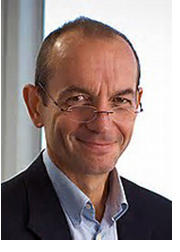The merits of an equal basis of ignorance
This post is republished from Into Practice, a biweekly communication of Harvard’s Office of the Vice Provost for Advances in Learning
 Giovanni Parmigiani, Professor of Biostatistics, selects new scientific articles as well as opinion pieces for freshman seminar course FRSEMR 22H – My Genes and Cancer to discuss in-the-moment scientific discoveries in genetics research, and encourages students to also recommend topics of interest. This “equal basis of ignorance” establishes an environment where he and his students learn and develop opinions together.
Giovanni Parmigiani, Professor of Biostatistics, selects new scientific articles as well as opinion pieces for freshman seminar course FRSEMR 22H – My Genes and Cancer to discuss in-the-moment scientific discoveries in genetics research, and encourages students to also recommend topics of interest. This “equal basis of ignorance” establishes an environment where he and his students learn and develop opinions together.
The benefits: Less constrained by his expertise, Parmigiani finds students ask the really simple (and hard) questions. They have to wrestle more concretely with moral dilemmas such as the implications of changing the genome of future children, poke holes in each other’s assumptions and arguments, and develop their own voices. This deepens debate and discussion.
The challenges: Sometimes the real-time focus can be challenging to manage: “A few times I’ve entered into ‘no man’s land’ where I posed a challenge that no one feels comfortable speaking about.” While he expects some readings might be technically challenging for students, his goal is to help students understand the scientific content just enough, allowing them to explore the ways in which such information might lead a patient to make a life-altering health decision.
Takeaways and best practices
- Ask students to select some of the readings. Parmigiani provides reading material for the start of the semester, but asks students to bring in new scientific literature outside of his expertise: “Venturing into unknown territory allows me to become more of a facilitator than a teacher—I am able to study along with them.”
- Let them struggle.Rather than offering solutions, Parmigiani gives students time to introspect and explore the science and ethical dilemmas with one another: “You struggle with them until something gels in their head and makes sense, but the way you do it is by debating and hearing others’ opinions.”
- Assign a real-world exercise.Toward the end of the semester, Parmigiani organizes mock genetic counseling sessions. The students have to counsel a colleague playing the role of a cancer patient and this reveals their understanding of “the three cornerstones of knowledge for the class: the genetics or inheritance of cancer, the probabilities and odds related to cancer, and the treatment options for cancer and prevention.”
Bottom line:De-emphasizing the authoritative professorial role lends an urgency to the discussion and amplifies participation; “Students feel more in charge and responsible for the learning happening in class.”

